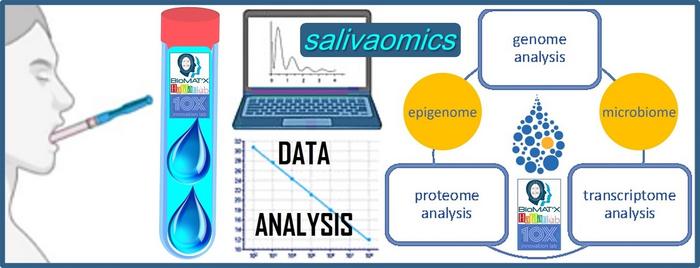
In an unprecedented era of healthcare diagnostics, the fusion of point-of-care (PoC) testing, artificial intelligence (AI), and innovative biomarker research is reshaping medical practices globally. Pioneered by experts like Prof. Dr. Haidar, the recent study sheds light on the transformative potential of these technologies, particularly in the realm of non-invasive diagnostics. These advancements promise not only greater accessibility but also the potential for faster and more accurate disease detection and management.
The concept of point-of-care diagnostics emphasizes delivering medical testing where patients are, thus eliminating lengthy processes associated with traditional laboratory diagnostics. As the world faces escalating health challenges, the need for rapid and reliable diagnostic solutions is more pronounced than ever. PoC testing allows for immediate results, empowering healthcare providers to make decisions without the delays that can often prove critical.
In recent years, technological innovations including lab-on-a-chip devices and microfluidic systems have emerged, enabling complex medical tests to be conducted on small samples in real time. This revolutionary approach drastically reduces the dependency on centralized testing facilities and paves the way for a more efficient patient care system. By placing testing equipment in the hands of practitioners or even patients themselves, healthcare delivery becomes more agile and adaptive.
Furthermore, AI’s role in diagnostics cannot be understated. By leveraging vast datasets, AI algorithms are capable of analyzing complex patterns that may elude human detection. This not only enables earlier disease identification but also fosters a tailored healthcare experience. The application of AI in diagnostics is making it possible to predict disease progression and suggest personalized treatment protocols, marking a significant departure from one-size-fits-all approaches to care.
One of the most exciting developments within the realm of PoC technologies is the emergence of non-invasive testing methods. Traditionally, invasive procedures such as blood draws have been the gold standard for diagnostic tests; however, technologies allowing for saliva-based diagnostics are revolutionizing this landscape. Saliva, as an accessible biological fluid, could facilitate rapid testing for a myriad of conditions, including infectious diseases, systemic disorders, and even certain types of cancers. This method not only enhances patient comfort but also encourages broader participation in health screening programs.
The COVID-19 pandemic highlighted the undeniable importance of rapid testing technologies in safeguarding public health. During the crisis, PoC tests emerged as crucial tools for tracking the virus’s spread and informing immediate health decisions. Innovations like rapid antigen tests and saliva-based diagnostics mobilized healthcare responses worldwide, underscoring the significance of quick, reliable, and easily deployable testing methodologies in crisis management.
As healthcare systems are compelled to adopt more efficient models, the integration of AI with PoC diagnostics is becoming increasingly prevalent. The synergy between these technologies is expected to yield superior diagnostic capabilities, advancing not just immediate clinical judgment but also long-term healthcare strategies. Upcoming developments, including the announced Stargate SuperAI project, aim to harness AI’s potential in maximizing the efficacy of diagnostics significantly.
The potential impact of the Stargate initiative is particularly noteworthy, as it seeks to propel research and development in AI-driven healthcare solutions. This ambitious project aligns with the ongoing efforts to develop cutting-edge diagnostic tools that can accurately interpret complex biological data. Through enhanced AI systems, future diagnostics can pursue unprecedented accuracy, enabling healthcare providers to identify disease markers with greater sensitivity.
The concept of personalized medicine, combining omics technologies including genomics, proteomics, and metabolomics, is also gaining traction. By analyzing individual genetic and molecular profiles, PoC diagnostics can provide tailored health assessments, allowing for proactive management of diseases before they escalate. This paradigm shift towards personalized healthcare reinforces the importance of integrating innovative technologies with clinical practice to meet diverse patient needs.
While the advancements in PoC technologies are exciting, there are still critical challenges to address. Ensuring the accuracy and reliability of these tests in various environments is essential for their widespread adoption. Moreover, integrating PoC testing into existing healthcare frameworks must prioritize usability, affordability, and patient safety, ultimately ensuring that these technologies can be implemented without extensive barriers.
Data management remains another pivotal concern as AI takes center stage in the future of diagnostics. As healthcare providers adopt AI-enhanced tools, there is an acute need for robust systems capable of protecting sensitive patient information while efficiently managing the analysis and utilization of generated data. These considerations are critical in establishing a healthcare ecosystem where trust and innovation can coexist seamlessly.
The continuous push for R&D&I will be fundamental in driving the evolution of PoC technologies. Researchers are already focused on leveraging AI to facilitate the discovery of new biomarkers, which holds immense potential not just for diagnostics but also for unlocking novel therapeutic avenues. As advancements continue, the role of PoC technologies in the broader healthcare landscape is set to expand significantly.
In conclusion, the convergence of PoC testing, artificial intelligence, and biomarker research heralds a new chapter in healthcare diagnostics. As the healthcare landscape evolves, these innovations promise a future where diagnostics are not only faster but also more accurate and accessible, leading to improved patient care outcomes. The upcoming years are set to redefine how we approach diagnostics, bridging the gaps between technological capability and patient need in unprecedented ways.
Subject of Research:
Article Title: Molecular biomarkers in salivary diagnostic materials: Point-of-Care solutions — PoC-Diagnostics and -Testing
News Publication Date: 6-Feb-2025
Web References: https://doi.org/10.55092/bm20250002
References:
Image Credits: Credit: ZS HAiDAR/BioMAT’X I+D+I LABs, Santiago de Chile.
Keywords
Applied sciences, engineering, healthcare technology, point-of-care testing, artificial intelligence, diagnostic innovations.
Tags: artificial intelligence in healthcarefuture of medical diagnosticshealthcare accessibility improvementsinnovative biomarker researchlab-on-a-chip devicesmicrofluidic systems in diagnosticsnon-invasive medical testingpatient empowerment in healthcarepoint-of-care diagnosticsrapid disease detection technologiesreal-time medical testing solutionstransforming healthcare delivery systems





